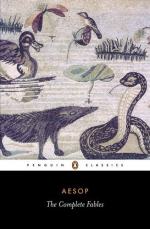|
This section contains 10,144 words (approx. 34 pages at 300 words per page) |

|
SOURCE: "The Fable Is Inverted: 1628-1700," in Fables of Power: Aesopian Writing and Political History, pp. 81-109. Durham: Duke University Press, 1991.
In the following essay, Patterson maintains that in seventeenth-century England the Aesopic fable was refined into a verbal weapon. No longer limited in range to local or temporal political issues, the genre was used to dealt with larger, more universal issues such as the conflict between absolute and parliamentary power.
The world is chang'd and we have Choyces,
Not by most Reasons, but most Voyces,
The Lion's trod on by the Mouse,
The lower is the upper House:
The feet, and lower parts, 'tis sed,
Would trample on, and off the head,
What ere they say, this is the thing,
They love the Charles, but hate the King;
To make an even Grove, one stroke
Should lift the Shrubb unto the Oake.
Anon: "A Madrigall on Justice...
|
This section contains 10,144 words (approx. 34 pages at 300 words per page) |

|


